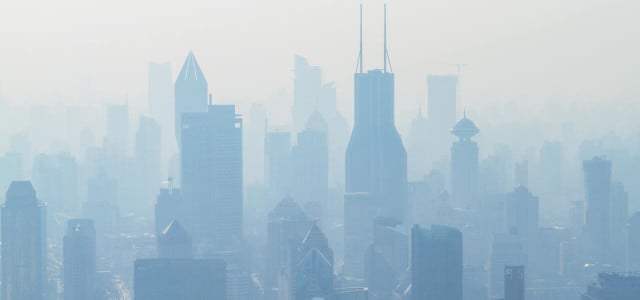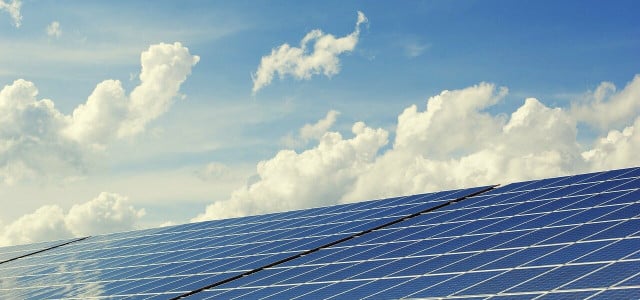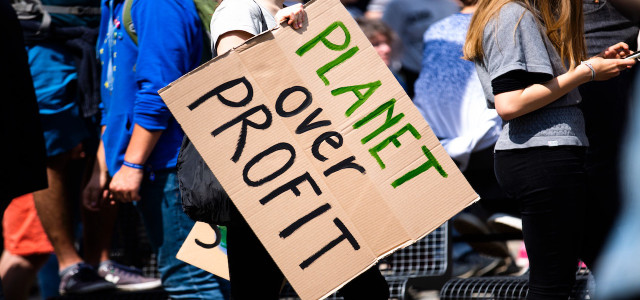Climate change denial and belief in the "climate change hoax" pose a serious threat to environmental protection. Here's how to stand up to climate change deniers.
Climate change, a global problem driven by human activities like burning fossil fuels, deforestation and industrial processes, is causing the planet’s temperature to rise alarmingly. This temperature increase leads to a host of negative consequences, such as extreme weather events, rising sea levels, threats to biodiversity, and problems with our health and food supply.
With scientists worldwide agreeing on the causes and impacts of climate change, efforts to fight and adapt to these changes are becoming increasingly important. Ultimately, climate deniers and belief in the “climate change hoax” threaten to hold up progress.
Climate Change Hoax: The Emergence of Climate Denial

(Foto: CC0 / Pixabay / PIRO4D)
Even with a mountain of evidence supporting the reality of human-caused climate change, a small but loud group of people continues to deny or downplay the issue. Climate deniers use various strategies, from spreading false information to pushing conspiracy theories — like the “climate change hoax” — to create doubt about the scientific consensus. This denial can have serious consequences, as it slows down or stops the critical steps needed to address climate change.
One common conspiracy theory is that climate change is a way for governments to exert greater control over people’s lives and economies through policies such as carbon taxes or carbon emissions regulations. Others believe that climate change is a way for environmental organizations to raise money or promote a particular agenda. Some even argue that the scientific consensus on climate change is part of a larger conspiracy to suppress alternative viewpoints and maintain the status quo.
Why It’s Important to Tackle Climate Change Denial
To effectively combat and adapt to climate change, we need to confront the influence of climate change deniers and promote a clear understanding of this global challenge. Proving the “climate change hoax” wrong allows us to create a more informed conversation, push for responsible policies and ultimately join the worldwide effort to deal with the problems created by our changing climate.
Delving Into the Climate Change Denial Phenomenon
To convince climate deniers that global warming and climate change aren’t made up, it’s helpful to be aware of the common arguments.
Typical Arguments Made by Climate Deniers
Climate change deniers rely on an array of tactics to sow doubt about the scientific consensus and perpetuate the notion of a “climate change hoax.” Some of their go-to arguments include:
Natural climate fluctuations: Deniers frequently assert that Earth’s climate has always been in flux, implying that current changes are simply natural events rather than consequences of human actions. Read our guide to Why the Difference Between Weather and Climate Matters for help disputing this particular argument.
Disputed scientific consensus: By selectively choosing data or pointing out supposed inconsistencies in research findings, climate deniers try to convey the impression that the scientific community is not in agreement about climate change. However, according to numerous studies, and organizations including NASA and the American Association for the Advancement of Science, around 97% of actively publishing climate scientists agree that human activities are the primary cause of the current warming trend. Some sources claim that the percentage is now even higher. This overwhelming consensus among experts leaves little room for doubt.
Economic concerns: People who believe in the “climate change hoax” often highlight the assumed economic repercussions of climate action, arguing that efforts to fight climate change would damage the economy and threaten people’s livelihoods. However, according to the World Economic Forum, the race to net zero will not only benefit our environment but will also lead to long-term economic growth. “This economic transformation could bring significant and more sustainable economic prosperity, due to the averted costs of climate damage and the new jobs, industries, innovations and opportunities that a decarbonized global economy would create,” it states.
Conspiracy theories: Some deniers promote the idea that climate change is an elaborate hoax devised by scientists, governments or other groups for financial or political advantage. See the 97% figure above — would so many scientists worldwide be coordinating to dupe the public? We think not.
The Impact of Misinformation and Disinformation
The spread of misinformation (unintentionally false information) and (intentionally false information) plays a significant role in perpetuating climate change denial. Untruths can infiltrate mainstream media, social media platforms and even educational resources, making it challenging for the public to differentiate between fact and fiction. Recognizing and addressing sources of misinformation and disinformation allows us to counter the sway of climate deniers and debunk the myth of a “climate change hoax.”
Climate Change Denial: The Facts Aren't Always Enough



(Foto: CC0 Public Domain / Unsplash - annie spratt)
In today’s increasingly digital age, we can get information from a virtually endless variety of sources. However, not all the information we consume is accurate. When it comes to the climate crisis, countless denial theories claim the so-called “climate change hoax” was invented to impose expensive environmental protection measures on citizens and advance political and economic interests.
These sentiments almost seem amusing until we consider the real-world consequences of the efforts against climate protection — especially when such theories find prominent supporters.
Take a closer look at the arguments of climate change skeptics, and you’ll quickly notice a pattern: their views often use rumors and pseudo-scientific misinformation, which are constantly repeated and rehashed. Consequently, many “global warming hoax” talking points never really leave the debate for good.
Utopia’s tip: 15 Everyday Ways to Prevent Climate Change
Sometimes, it may not be enough to counter arguments about the “climate change hoax” with cold, hard facts. So how can you sustainably confront the convictions of climate deniers? Is it possible to convince them otherwise?
In their efforts to find an answer to this question, scientists from the Universities of Queensland and Western Australia have developed a guide to debunking misinformation that can be used against proponents of climate change denial and in a variety of other fields and situations. The method boils down to three main points:
- Focus on the facts, not the rumor.
- Before you discuss a specific myth, clearly label it as false information.
- Any refutation should encompass an explanation that provides factual clarity in areas neglected by the misinformation.
1. Facts First
The human brain receives and processes information in highly complex cognitive processes. Once our brains receive false information and evaluate it as accurate, it’s difficult to correct it just by providing true and factual information instead. The researchers who developed the guide to debunking misinformation found that such discussions pose challenges due to “boomerang” effects:
- The more familiar a piece of information or message is, the more likely it will be accepted as valid. If you repeat the rumor — even if to refute it — you can end up confirming it in the long run.
- Simple, concise information is easier to process and more readily accepted than detailed, complicated explanations. It’s best to have two or three sound arguments to use in a quick discussion.
- Refuting misinformation when dealing with people with strong opinions on a particular subject is particularly tough. If confronted with contradictory points, they will be all the more eager to fall back on arguments supporting their worldview — and thus strengthen their convictions.
It’s always best to have your facts straight before diving into a heated discussion with someone who believes in a “climate change hoax”. Luckily, we have a broad range of guides and information about the environment to help. Here’s some inspiration:
- The Top 5 Human Activities That Contribute to Air Pollution
- Edge Effects: How Humans Interfere With the Ecotone
- NFTs and Environmental Impact: The Controversy
- What Causes Ocean Acidification? Can It Be Reversed?
- What Is Sustainable Development and Why Is It Necessary?
2. Clearly Identify Falsehoods and Myths



(Foto: CC0 Public Domain / Unsplash - mimi thian)
You can’t always avoid speaking about climate change denial myths if your primary goal is to debunk them. In such cases, point out that statements about myths contain misinformation.
Climate change skeptics often support their arguments with misconceptions and logical fallacies. By identifying these errors in reasoning and providing clear explanations, you can dismantle their arguments and promote a more accurate understanding of climate change.
For example, it’s scientifically proven that humans are the primary cause of global warming. Nevertheless, the rumor that the worldwide temperature rise is due solely to natural processes remains persistent among climate deniers. They deny man’s contribution to global warming despite widespread consensus within the scientific community that the “global warming hoax” doesn’t actually exist.
3. Provide Conclusive Explanations
Even once rumors have been refuted by facts, problematic viewpoints can persist. If misinformation is the only explanation someone has for a given situation, they tend to fall back on it — even if aware the information is inaccurate. To convince your counterpart in the long term, offer arguments backed by realistic (and conclusive) explanations.
Once you’ve identified a particular climate change denial rumor as false, you need to provide a science-based explanation for the man-made climate crisis. The “climate change hoax” leaves important questions to be answered, and it’s your job to answer them with facts.
The UN Intergovernmental Panel on Climate Change (IPCC) confirms that humans are responsible for an increase of approximately 1.1° Celsius in global temperature compared to pre-industrial levels. What does that mean? Climate deniers try to rally support for the “global warming hoax” without the whole truth.
The most effective way to help skeptics consider the truth is to track down the trick or argument that convinced them of the “global warming hoax” in the first place.
Building Bridges: Moving Beyond the "Climate Change Hoax" Narrative



(Foto: CC0 Public Domain / Unsplash - thomas richter)
To effectively challenge the “climate change hoax” myth and encourage climate action, it’s essential to build bridges and foster understanding among diverse stakeholders. Below, we’ll explore strategies for finding common ground, highlighting the benefits of climate action, and promoting local initiatives, education and collaboration. By working together and focusing on shared goals, we can overcome the divisive narrative of climate change denial and drive meaningful progress toward a sustainable future.
Find Common Ground
One of the most effective ways to combat the “climate change hoax” narrative is by finding common ground with skeptics. Focus on shared values and concerns, such as preserving the environment, promoting economic growth or protecting kids from the effects of climate change. By identifying areas of agreement, you can establish a foundation for a more productive conversation.
Tip: Intellectually humble people are usually more successful in bridging differences, as they listen to and consider the viewpoints of the conversational partner honestly and respectfully. Learn how to foster that skill in yourself: Unlock Intellectual Humility: Uncovering Its Benefits, Obstacles, and Development
Highlight the Benefits of Climate Action
Emphasize the numerous benefits of taking climate action, including creating new job opportunities, improving public health and promoting energy independence. Our guide The 6 Types of Renewable Energy – And Why We Need Them Now can help you make those points. By showcasing the positive outcomes of addressing climate change, you can help skeptics see the value in supporting these efforts, even if they continue to believe in the “global warming hoax”.
Encourage Local and Community Action
Local and community-level environmental activism can be a powerful force in the fight against climate change. Encourage skeptics to get involved in local initiatives, such as tree planting, starting a community garden, recycling programs or renewable energy projects. By taking part in tangible, community-driven efforts, skeptics may gain a deeper appreciation for the importance of addressing climate change, regardless of their views on the “climate change hoax.”
Support Climate Education
Promoting climate education is essential in creating a more informed public and dispelling the myth of a “climate change hoax.” Advocate for climate science to be included in school curricula and support initiatives that provide accurate, evidence-based information about climate change to the broader public. The good news is that there are more and more universities with sustainability programs, showing that the force behind the cause is growing!
Collaborate with Diverse Stakeholders
Collaboration between diverse stakeholders, such as businesses, governments and civil society, is vital in combating climate deniers and fostering climate action. By working together — and avoiding greenwashing — we can create a united front against the “climate change hoax” narrative and drive meaningful progress.
Uniting Against Climate Change Denial and Championing a Sustainable Future
Before entering into any discussion, especially one countering the “climate change hoax” it’s essential to have a general knowledge of the topic, sourced from up-to-date, trustworthy sources. Always remain factual and avoid dramatic language, as this can make people feel personally attacked and hinder productive conversation.
By engaging in productive conversations, debunking misconceptions, and promoting science-based decision-making, we can bridge divides and encourage cooperation.
Remember that although we aren’t all entitled to our own facts, sometimes debating the “global warming hoax” with climate deniers just isn’t worth your time. Focus on promoting understanding and climate action where it can make a real impact. It’s time to move beyond climate change denial and embrace the solutions that will safeguard our planet and its inhabitants.
Read more:
- 5 of Nestlé’s Worst Controversies Explained
- Everyday Palm Oil Products — and Sustainable Alternatives
- What Does Afforestation Mean and Why Is It Important?
Do you like this post?












